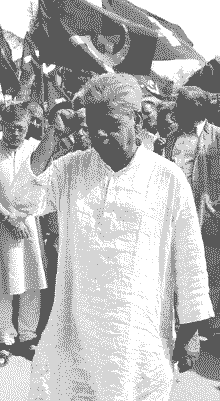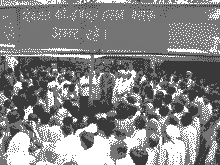
Comrade Basru was born in 1943 in Godda district of Jharkhand (then undivided Bihar). He received his schooling at Mirzaganj in Giridih, in the same school where his father taught Urdu. He completed his school finals from Patna College, where he first came into contact with the communist movement, joining the AISF. In the 1960s he was drawn closer to the Communist Party of India (CPI), taking a formal party membership in 1968. In 1970 he formed the Mirzaganj unit of the party, and soon led a powerful anti-feudal peasant movement, challenging bonded labour, usury and assaults on dalits, adivasis and women. Within a very short time, this militant movement made its mark and led to the rapid expansion of the party in the district. In 1972, he also led the resistance to communal politics of the Jan Sangh-RSS.
In 1973, he was jailed for the first time; in his subsequent political life in the thick of people’s movements, he was jailed many times. In the 1980s, he again led a powerful anti-feudal mass upsurge, and the success of CPI candidates in elections was attributed in significant measure to his efforts.
However, by the 1990s, he began to be dissatisfied with the politics and tactics of the CPI, and eventually came closer to the CPI(ML), which was rising as a powerful force in Giridih and Jharkhand. In 2002, he joined the CPI(ML), and in the 7th Party Congress of the CPI(ML) at Patna in November 2002, he was elected to Central Committee of the CPI(ML).
In the extremely challenging period following the martyrdom of Comrade Mahendra Singh, Comrade Basru shouldered a very crucial part of the responsibility, striving to achieve Comrade Mahendra Singh’s goal of achieving the party’s growth in Giridih.
A very modest and down-to-earth comrade, he easily integrated himself with the toiling poor. He epitomised the communist lifestyle; even with many economic and health travails faced by his family, he always relied on the people and dedicated himself to the party.
Comrades in Jharkhand know that till the very end, he remained quiet about his illness, playing a leading role in the recent militant struggle against irregularities in implementation of NREGA in Jamua.
Our thoughts are with his bereaved family in their hour of loss.
Comrade Basru – your simplicity, your courage, your communist spirit and dedication will continue to inspire comrades!
 Comrade Basruji’s family members to accompany his body. Several West Bengal party comrades from Kolkata and adjacent districts like North 24 Parganas and Howrah and several members of the Party Central Committee and West Bengal State Committee including Comrade Dipankar Bhattacharya, were present at the airport to receive the human remains of the departed leader. As the funeral cortege proceeded by road from Kolkata to Jharkhand, comrades from various districts of West Bengal and Jharkhand gathered along the GT Road to pay tribute to their beloved leader. At the Party office at Bagodar, his body was kept by the side of Comrade Mahendra Singh’s statue, and a stream of people came to pay him tribute, including several members of the party Central Committee and Politburo. The next morning, the funeral procession reached Jamua. Hundreds of Party members and admirers of Comrade Basru stood in silence for two minutes and paid floral tributes before the funeral procession moved towards the burial ground.
Comrade Basruji’s family members to accompany his body. Several West Bengal party comrades from Kolkata and adjacent districts like North 24 Parganas and Howrah and several members of the Party Central Committee and West Bengal State Committee including Comrade Dipankar Bhattacharya, were present at the airport to receive the human remains of the departed leader. As the funeral cortege proceeded by road from Kolkata to Jharkhand, comrades from various districts of West Bengal and Jharkhand gathered along the GT Road to pay tribute to their beloved leader. At the Party office at Bagodar, his body was kept by the side of Comrade Mahendra Singh’s statue, and a stream of people came to pay him tribute, including several members of the party Central Committee and Politburo. The next morning, the funeral procession reached Jamua. Hundreds of Party members and admirers of Comrade Basru stood in silence for two minutes and paid floral tributes before the funeral procession moved towards the burial ground.